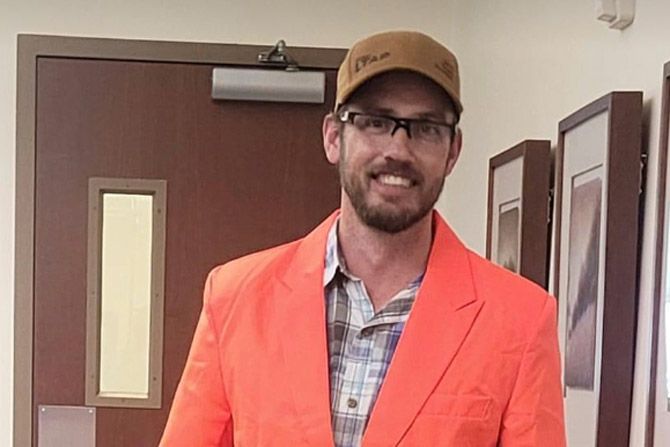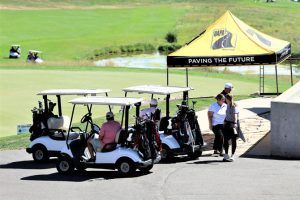UAPA is always excited to get to know the people who maintain our roads and keep our communities active and vibrant. We had the chance to talk to the Street Supervisor for Vernal City, Clint Morton, who gave us some insight into his experience in the industry, the current city projects and what things are on the horizon for asphalt.
Please give us your background.
I grew up in the Dutch John area, northeast of Flaming Gorge. The town had 150 people, and I spent my life fishing and camping. Most of my family is from Vernal, so I moved to Vernal after serving a mission for my church. My wife and I have been married for 19 years and have five children, four of them living as we lost our youngest son.
I worked in a furniture warehouse before I worked for the city, but after our now-17-year-old daughter was born, I needed a job with better insurance. We have children with special needs and medical issues who have been life-flighted from Vernal to Salt Lake City and spent time in the ICU after their birth. The city job I was hoping for was open and available, and I was hired in 2006. It was my first job in construction and maintenance, and I am grateful they hired me.
The family aspect of working for the city has been amazing. Being employed by a government agency has its benefits because I am home every night, and I haven’t had to worry about whether I will still have a job if I take any of our children to the doctor. I can go to activities and be there for celebrations. Many neighbors work in the oil fields for weeks at a time. Granted, they make more money and have more toys, but they can’t spend time with family like I do.
The Vernal community in the Uintah Basin is very giving. People volunteer to help each other, and it’s another reason why I like working with the city. Some of my children’s medical problems occurred when I was a Street Supervisor. When I told the crew what was happening, they stepped up and helped me. They are a great team.
I love serving the community. Keeping the streets safer by plowing and cleaning them is rewarding because I give back and serve people who put together community charity events and helped my family.
Tell us about more about working for Vernal City.
As I mentioned, I’ve been with Vernal City for 17 years. I started as a maintenance worker, nothing too fancy, but I worked my way into different positions. After getting into the inspection side, I did infrastructure inspections for about eight years. Then, I went to school online to get public works certification as a construction manager. The American Public Works Association offers an intense program of classes through the Donald G. Stone Institute. To help pay for it, Reed gave me a scholarship from UAPA. That scholarship was a big benefit and finishing the program helped me earn an associate’s degree in business management. I became a supervisor when the last supervisor retired. I have worked as a street superintendent for the last three years.
I’ve taught classes for 10 years about traffic control certification for the Utah Local Technical Assistance Program. The program is based out of Utah State University in Logan, and it offers traffic control and road maintenance classes for government agencies.
What has changed over the course of your career?
Vernal City’s population has grown quite a bit, and I’ve learned new skills and gained knowledge as it has grown. We have more residents than we’ve had for a while, and we’ve adjusted how we run programs to keep the community safe.
The supervisor I took over for did a great job for 40 years. However, he did it all without computers. We’ve had fun, challenging times putting new systems into place, and now we use a geographical information system to manage road and sidewalk maintenance assets.
Some changes have been political. Mayors, city council members and managers change periodically; whenever someone new comes in, they have agendas to focus on. You always have to make adjustments to facilitate those.
COVID caused some major adjustments and challenges as well. We looked at whatever happened and rolled with the situation.
What are you currently working on with Vernal City?
We have some awesome projects. The current city manager has a great vision for downtown revitalization, new parking lots and increased beautification. He wants to add more businesses and residential areas so the downtown area is more walkable. Many small towns see the downtown area fall apart when their business development moves to the outskirts. It happens all over the country. But we are trying to create a welcoming downtown area where businesses want to be and people want to hang out. We have some big projects to increase accessibility by providing parking and other needs that businesses might want so that they will stay downtown.
What are the “big things” on the horizon that will change your job in the future?
Everybody drives a pickup truck in a small community. But there is a big push for cities and towns to get the infrastructure in place for electric vehicles and add charging stations. We are getting federal and state grants to help us because we can’t do all the work on our own.
Figuring out the details about how that will happen will be a big undertaking for most cities and towns to look at because we don’t currently have the infrastructure, and we will have to make adjustments. For example, Vernal doesn’t own any charging stations, even though a couple of places have them. However, we are putting in parking lots that will have several charging stations.
Can you share an experience where you or Vernal City worked with UAPA to achieve something?
UAPA helps out guys like me who are just trying to improve and do better at their jobs. For example, UAPA sponsors scholarships and raffles. Also, UAPA recently brought the Central Eastern Regional Asphalt Summit back to our area, and we had 70-75 attendees. We usually have to drive to a bigger city to get that kind of education, so we appreciated it.
Reed and the whole group over there at UAPA are just awesome.







